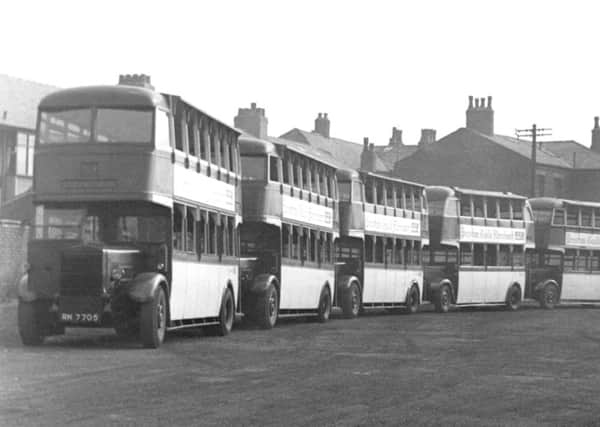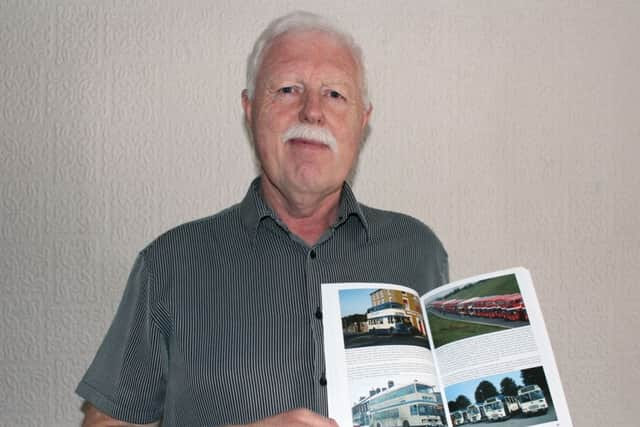Transports of delight


Bus fan Mike Rhodes thinks his free pensioner pass is just the ticket.
Most days the 63-year-old can be found riding around Preston on single and double-deckers, going nowhere in particular.
Advertisement
Hide AdAdvertisement
Hide AdThere isn’t much about the city’s fleet that Mike doesn’t know. After all he’s probably ridden on all 102 of them.


So who better to write a book on the history of Preston buses than a self-confessed fanatic whose will decrees his cortege takes him past the depot in Deepdale Road on his final journey?
“I’ve stopped short of wanting a bus as a hearse,” laughed Mike.
Preston has had buses since 1922. Mike has been fascinated by them since being “bitten by the bug” as a small child in the 50s.
Advertisement
Hide AdAdvertisement
Hide AdThere is hardly a day goes by when he doesn’t take a trip somewhere, usually starting aboard the No 35 which runs near his home in Ingol.
“I just go for the ride,” admitted Mike. “I’m not actually going anywhere. If I wanted to go shopping I’d take the car. Buses are just my passion, although I do like trains as well.”
Mike’s new book, called Preston Buses, is a sequel to one he wrote back in 1995 entitled Preston Buses and Transport.
It brings the story bang up to date, from the introduction of electric trams in 1904 to today’s all-singing, all-dancing automatics. “It’s a fascinating history,” said Mike, who came into close contact with Preston’s bus fleet during 37 years working on highway maintenance for the local council.
Advertisement
Hide AdAdvertisement
Hide Ad“It started for me in the ‘50s when all the holiday traffic used to come along Blackpool Road heading for the coast and I was impressed by the different buses from across Lancashire, Yorkshire and the Midlands.
“About 70 per cent of the photos in the book are mine, taken over the years. I even had a spell going down to London because I was interested in their buses. But it’s chiefly been Preston.
“Since the early ‘70s I’ve probably got to know all the engineers and managers at Preston Bus personally and become friends. I go to the depot on a near daily basis and I’ve almost got open access to the place.
“They even invited me to design the livery of the fleet in 1999 – which was a great honour for me – and there are still some examples of that today on the Dennis Trident buses which still run on the 35 service to Tanterton, the No 8 to Moor Nook and the 23 to Fulwood Asda.” Preston Bus’s distinctive blue and white colour scheme only arrived in 1966. Prior to that the buses were in the same colours as the old trams, maroon and cream.
Advertisement
Hide AdAdvertisement
Hide Ad“In 1966 the town coucil decided to change the colours, although no-one seems to know the exact reason for it,” explained Mike.
“Whether it was with blue and white being North End’s colours, I don’t know.”
The first one-man services arrived in 1968, but it took until 1982 before conductors disappeared altogether. The new blue and white livery, which had been voted for by the public from a choice of four in 1966, survived on some routes until 1998.
A watershed moment for Preston Bus came in 2009 when Stagecoach took over the company. But the Competition Commission frowned on the deal and, after two years,Preston Bus passed to current owners Rotala.
Advertisement
Hide AdAdvertisement
Hide AdDoes Mike have a favourite bus from 92 years of motorised public transport in Preston? “I’d go for a model built by MCW in Birmingham on a Leyland chassis in 1955. Preston had a little batch of five of them and they all lasted for 20 years of sterling service.
“Goodness knows how many miles they clocked up during that time. But buses don’t last forever and they were eventually scrapped in Barnsley.
“Having said that, there are a number of old Preston buses preserved. I think the oldest is a 1932 Leyland Lion which, throughout the ‘50s and ‘60s, served as a mobile library.
“I saw a photo of it some years back. Someone in the South of England had set about trying to restore it to its original glory.
It would be brilliant if it has been completed and is running around again.”